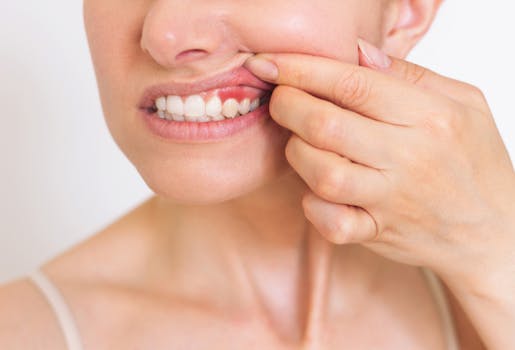The most common causes of toothache
We are probably all familiar with painful feelings in the mouth. But where does the pain come from? Is it necessary to go straight to the dentist's office or are there also home remedies to relieve the pain? And why does the pain arise in the first place? We will answer these questions in this blog post and help you to prevent toothache in the future.



What causes toothache?
The reasons for toothache can range from mild to severe. Maybe you have a cold and feel that your teeth are more sensitive to pain. Or maybe you have more serious dental problems and need to have them checked at the dentist or ALPINE WHITE Studio. Read the next sections to learn more about the possible causes so you can avoid emergency dental appointments.
A hole in the tooth - caries
A hole in the tooth, or caries, is one of the most common causes of toothache. Tooth decay is caused by poor oral hygiene and poor diet. Even if you brush your teeth regularly, you can still get cavities.
Caries develops when the spaces between your teeth are not cleaned thoroughly and plaque sticks to them. Plaque contains bacteria that attack tooth enamel and cause pain.
If you have caries, a visit to the dentist's office is unavoidable. This is because the affected teeth have to be cleaned of plaque and the tooth is then drilled out and filled with a dental filling.
To avoid cavities on the teeth or in between, plaque should be removed at least once a year during dental hygiene.
Cold
Even a cold can lead to toothache, especially if it is accompanied by sinusitis. With sinusitis, the sinuses near the root of the nose and around the eyes can become inflamed and filled with mucus. This inflammation and swelling can spread to the nearby teeth and pressure in the upper jaw, causing toothache.
Often the upper molars are affected the most because their roots are close to the sinuses. So if you have a cold with sinusitis and suddenly feel a toothache, it could be due to a transfer of inflammation and pressure from the sinuses to the teeth. Treating both the cold and sinusitis appropriately is crucial to relieve the toothache and address the underlying cause.
Read this article to learn more about toothache with a cold.
Exposed necks of teeth
Exposed necks of teeth can lead to toothache because the dentin-rich part of the tooth is now unprotected. Dentin is softer than enamel and contains tiny tubules that connect to the nerves of the tooth. When these tubules are exposed, they can become sensitive to stimuli such as heat, cold or certain foods.
Gingivitis (inflammation of the gums)
Gingivitis, or inflammation of the gums, can lead to toothache in certain circumstances. If plaque and plaque build up around the teeth and are not thoroughly removed, this can lead to infection of the gums. The inflamed and swollen gums can be sensitive, causing pain, especially when pressure is applied to the affected areas, such as when chewing or brushing.
Likewise, gingivitis can develop into periodontitis, where the inflammation spreads to the gum tissue and bone around the teeth. This can lead to loosening of the teeth and can also be associated with pain. It is important to visit one of our ALPINE WHITE Studios at the first signs of gingivitis such as redness, swelling or bleeding gums to treat the gingivitis and prevent possible toothache.
Tooth root inflammation
Tooth root inflammation occurs when the roots of the teeth become infected with bacteria. This can be caused by an untreated cavity or gum disease, where the bacteria penetrate deep into the soft tissue and bone near the root of the tooth.
The infection causes inflammation, which leads to tenderness and pain. If the infection progresses, it can spread further into the adjacent tissues and even into the jawbone if left untreated. This leads to increased pain, swelling, redness and tenderness in the area. If the inflammation is not treated, an abscess can form in the gum tissue near the root of the tooth. Unfortunately, this type of inflammation is particularly painful and leads to severe toothache. To heal the inflammation, root canal treatment is often necessary.
Teeth grinding
Teeth grinding, also known as bruxism, is a condition where people clench their teeth and put pressure on the jaw joint while sleeping or awake. This causes a lot of wear and tear on the enamel of the teeth and can lead to a number of problems such as increased sensitivity and toothache.
Here are some possible causes of nighttime teeth grinding:
- Stress and anxiety: Stress and emotional strain can lead to increased activity of the masticatory muscles, which can manifest as teeth grinding during sleep. People who are tense during the day or suffer from chronic stress are more likely to be affected by bruxism.
- Misalignment of the teeth and jaw: Abnormal tooth positions, an incorrect bite or misalignment of the jaw can increase the risk of teeth grinding. If the teeth do not fit together properly, this can lead to excessive pressure and friction during teeth grinding.
- Sleep disorders: Certain sleep disorders such as sleep apnoea or snoring can increase the occurrence of teeth grinding. The increased muscle activity associated with these disorders is thought to increase the risk of bruxism.
- Alcohol and drug use: The use of alcohol and certain drugs may contribute to nighttime teeth grinding. These substances can affect the nervous system and increase muscle tension in the jaw and face.
- Genetic factors: It is thought that bruxism may have a genetic predisposition in some cases. If there are cases of teeth grinding in the family, there may be an increased risk of being affected yourself.
Wisdom teeth
A toothache caused by wisdom teeth occurs when the teeth break through the gum line or cannot break through completely. When this happens, the pressure from the growth of these molars can cause swelling and inflammation in the affected area. This can lead to both pain and infection of the gums or jawbone.
In addition, the partially erupted wisdom teeth can trap food particles or other debris that cause further discomfort. Because wisdom teeth are so far back in the mouth, it is difficult to clean them properly, leading to an increased risk of plaque build-up and tooth decay.
Dental pulpitis
Pulpitis is a type of tooth inflammation that occurs when the pulp, which contains nerves, blood vessels and other cells, becomes inflamed due to injury or infection. In many cases, this inflammation is caused by a deep cavity or trauma to the tooth that has damaged the protective layers of enamel and dentin. This allows bacteria from the plaque to enter the tooth and reach the pulp, leading to infection. When the pulp is exposed to these bacteria, it becomes inflamed and painful as it expands and puts pressure on the surrounding area.
If it is found that the cause is inflammation of the pulp tissue, root canal treatment may be necessary to remove the affected tissue and restore the health of the area.
Fight toothache
If you have a long-lasting toothache, it is important to seek advice from an expert to ensure that any underlying causes are treated.
Home remedy for toothache
Simple home remedies, such as a balanced diet with plenty of vegetables and fruit, can help strengthen enamel and promote healthy teeth and gums. Over-the-counter painkillers such as ibuprofen or paracetamol can be helpful in relieving the discomfort caused by toothache. However, it is important to always consult a dental professional before taking any medication for pain relief.
Here are some tips for relieving toothache with home remedies:
Rinse your mouth with warm salt water
Dissolve a teaspoon of salt in warm water and rinse your mouth for about 30 seconds. The saltwater can reduce inflammation and temporarily relieve pain.
Use clove oil or clove
Soak cotton wool in clove oil and gently dab on the painful area. Clove oil contains eugenol, a substance with pain-relieving properties. Be careful, however, as too much clove oil can cause irritation. You can also bite a clove.
Use garlic
Add garlic clove into a paste and apply it to the painful tooth. Garlic has anti-inflammatory and antibacterial properties. Leave it on for a few minutes and then rinse thoroughly with water.
Cooling compress
For swelling or inflammation around the mouth, apply a cool compress to the affected area. Wrap an ice pack in a thin cloth and gently hold it against your cheek or the painful area.
Drink sage or chamomile tea
Sage and chamomile tea have anti-inflammatory properties and can help with toothache. If you don't like the taste of the tea, you can let it cool down and gargle it later.
Prevent toothache
You can prevent toothache with proper oral hygiene, regular professional dental cleanings and a balanced diet. Good dental care such as brushing twice a day with fluoride toothpaste, flossing daily, rinsing with an antiseptic mouthwash and avoiding sugary snacks will help keep your periodontium healthy. This can also help you avoid expensive dental treatments.
It's also important to have your teeth professionally cleaned at least once a year to detect problems that can lead to toothache early on. You can easily have this done at our ALPINE WHITE Studio. If you are unsure about your dental health, come in for an Oral Health Checkup and have your mouth checked.
Eating a balanced diet with plenty of fruit and vegetables can also help protect your teeth from decay by providing the necessary minerals for strong enamel and healthy gums.


